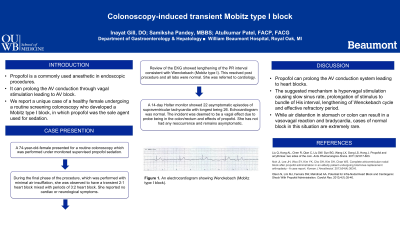Back


Poster Session D - Tuesday Morning
Category: Colon
D0150 - Colonoscopy-Induced Transient Mobitz Type 1 Block
Tuesday, October 25, 2022
10:00 AM – 12:00 PM ET
Location: Crown Ballroom

Has Audio

Inayat Gill, DO
William Beaumont Hospital
Royal Oak, MI
Presenting Author(s)
Inayat Gill, DO, Samiksha Pandey, MBBS, Atulkumar Patel, MD, FACG
William Beaumont Hospital, Royal Oak, MI
Introduction: Propofol is a commonly used anesthetic in endoscopic procedures. It can prolong the atrioventricular (AV) conduction through vagal stimulation leading to AV block. We report a unique case of a previously healthy patient undergoing a routine screening colonoscopy who developed a Mobitz type 1 block during the procedure, in which propofol was the sole agent used for sedation.
Case Description/Methods: A 74-year-old female with a medical history of diverticulosis and a family history of colon cancer in her first-degree relative presented for a routine colonoscopy performed under monitored supervised propofol sedation. During the final phase of the colonoscopy which was performed with minimal air insufflation, she was observed to have a transient 2:1 heart block mixed with periods of 3:2 heart block on the monitor. After the procedure was completed, she reported no cardiac or neurological symptoms. Review of an electrocardiogram strip showed lengthening of the PR interval consistent with Wenckebach (Mobitz type 1 block). This resolved post procedure. All labs were within normal limits. Prior to this procedure, she had no cardiac history nor was she on any medications. She was referred for a formal cardiology evaluation which included a 14-day Holter monitor showing 22 asymptomatic episodes of supraventricular tachycardia with longest being 26. No treatment was initiated. She also underwent an echocardiogram showing an ejection fraction of 75%, with a normal left ventricle. The incident was deemed to be a vagal affect due to the probe being in the colon/rectum and the effects of propofol. She has not had any recurrences of the Wenckebach phenomenon on subsequent electrocardiograms and continues to remain asymptomatic.
Discussion: Propofol can prolong the AV conduction system leading to a heart block even in patients without any cardiac history. The suggested mechanism is hypervagal stimulation causing slow sinus rate, prolongation of stimulus to the bundle of His interval, lengthening of the Wenckebach cycle and the effective refractory period. While air distention in the stomach or colon can also result in a vasovagal reaction and bradycardia, cases of nodal block in this situation are extremely rare. This case demonstrates that in addition to expected vasovagal bradycardia, nodal block is a rare possibility and hence the need for close continuous cardiac monitoring during endoscopy.

Disclosures:
Inayat Gill, DO, Samiksha Pandey, MBBS, Atulkumar Patel, MD, FACG. D0150 - Colonoscopy-Induced Transient Mobitz Type 1 Block, ACG 2022 Annual Scientific Meeting Abstracts. Charlotte, NC: American College of Gastroenterology.
William Beaumont Hospital, Royal Oak, MI
Introduction: Propofol is a commonly used anesthetic in endoscopic procedures. It can prolong the atrioventricular (AV) conduction through vagal stimulation leading to AV block. We report a unique case of a previously healthy patient undergoing a routine screening colonoscopy who developed a Mobitz type 1 block during the procedure, in which propofol was the sole agent used for sedation.
Case Description/Methods: A 74-year-old female with a medical history of diverticulosis and a family history of colon cancer in her first-degree relative presented for a routine colonoscopy performed under monitored supervised propofol sedation. During the final phase of the colonoscopy which was performed with minimal air insufflation, she was observed to have a transient 2:1 heart block mixed with periods of 3:2 heart block on the monitor. After the procedure was completed, she reported no cardiac or neurological symptoms. Review of an electrocardiogram strip showed lengthening of the PR interval consistent with Wenckebach (Mobitz type 1 block). This resolved post procedure. All labs were within normal limits. Prior to this procedure, she had no cardiac history nor was she on any medications. She was referred for a formal cardiology evaluation which included a 14-day Holter monitor showing 22 asymptomatic episodes of supraventricular tachycardia with longest being 26. No treatment was initiated. She also underwent an echocardiogram showing an ejection fraction of 75%, with a normal left ventricle. The incident was deemed to be a vagal affect due to the probe being in the colon/rectum and the effects of propofol. She has not had any recurrences of the Wenckebach phenomenon on subsequent electrocardiograms and continues to remain asymptomatic.
Discussion: Propofol can prolong the AV conduction system leading to a heart block even in patients without any cardiac history. The suggested mechanism is hypervagal stimulation causing slow sinus rate, prolongation of stimulus to the bundle of His interval, lengthening of the Wenckebach cycle and the effective refractory period. While air distention in the stomach or colon can also result in a vasovagal reaction and bradycardia, cases of nodal block in this situation are extremely rare. This case demonstrates that in addition to expected vasovagal bradycardia, nodal block is a rare possibility and hence the need for close continuous cardiac monitoring during endoscopy.

Figure: Lengthening of the PR interval consistent with Wenckebach (Mobitz type 1 block).
Disclosures:
Inayat Gill indicated no relevant financial relationships.
Samiksha Pandey indicated no relevant financial relationships.
Atulkumar Patel indicated no relevant financial relationships.
Inayat Gill, DO, Samiksha Pandey, MBBS, Atulkumar Patel, MD, FACG. D0150 - Colonoscopy-Induced Transient Mobitz Type 1 Block, ACG 2022 Annual Scientific Meeting Abstracts. Charlotte, NC: American College of Gastroenterology.
